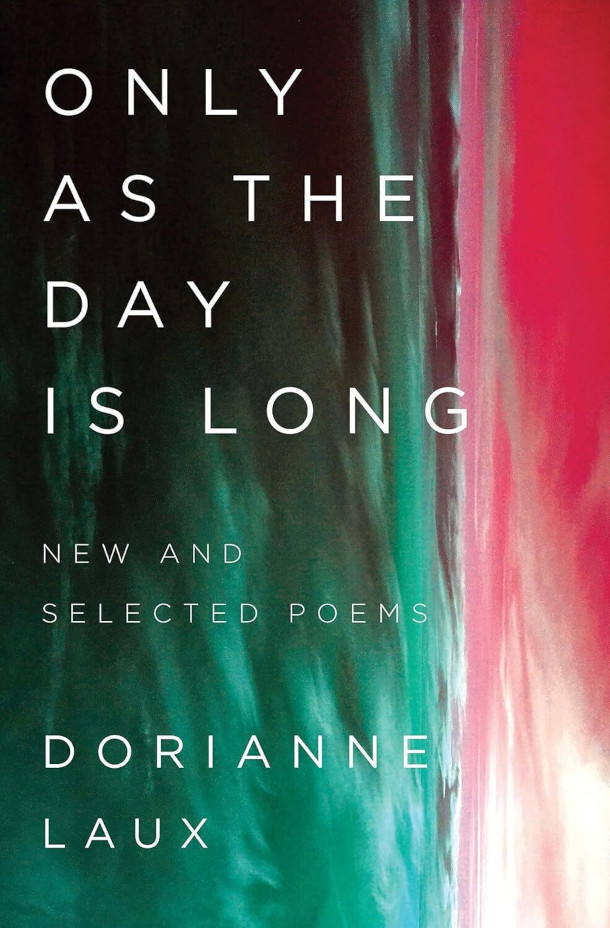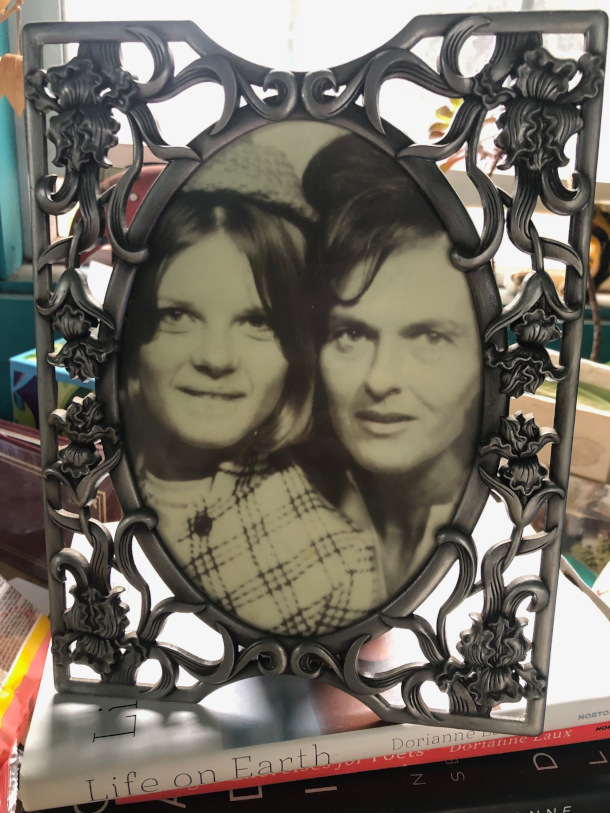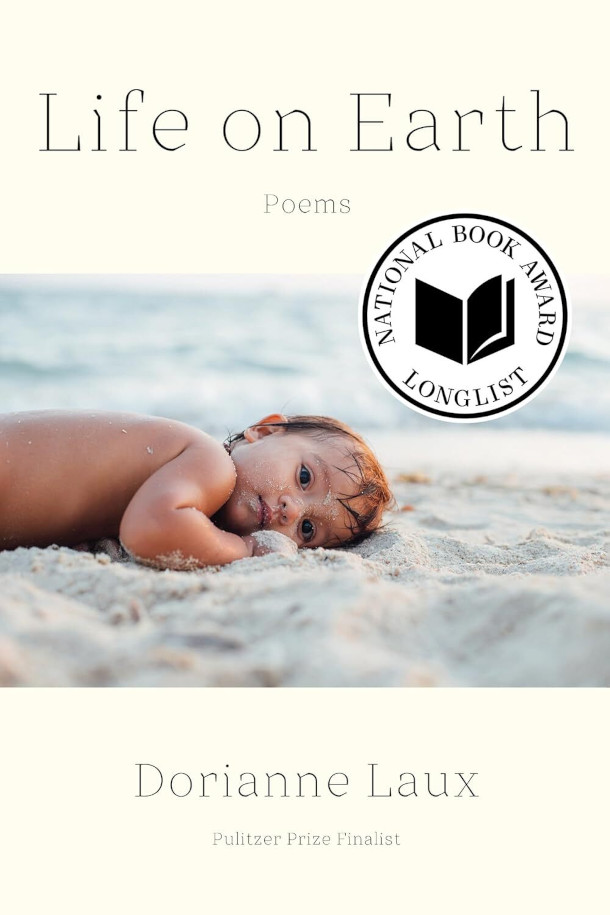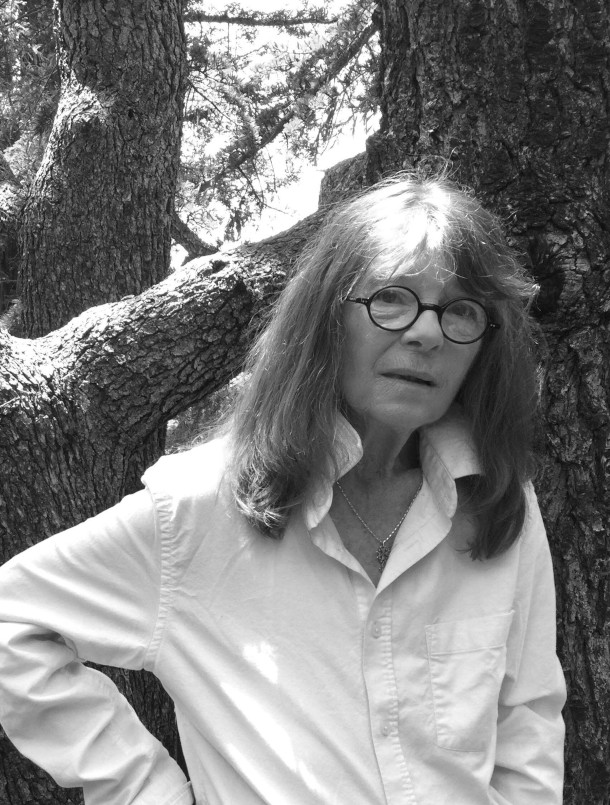"Evening" Poem by Dorianne Laux
Air Date: Week of April 25, 2025

Dorianne Laux’s sixth poetry collection, Only As the Day is Long: New and Selected Poems was named a finalist for the 2020 Pulitzer Prize for Poetry. (Photo: W.W. Norton & Company)
As Poetry Month ends, we turn to poet Dorianne Laux, whose latest collection is titled Life on Earth. Her poem “Evening” from a few years ago simultaneously expresses her grief at her recent loss of her mother and the waning of the whole biosphere in the face of climate disruption. Dorianne Laux joined Living on Earth’s Jenni Doering to read her poem and talk about finding solace in nature.
Transcript
CURWOOD: Life on earth was a key theme of the ministry of Pope Francis, and as poetry month ends, we turn now to poet Dorianne Laux, whose latest collection is titled life on earth. She has a poem from a few years ago that simultaneously expresses her grief at her recent loss of her mother and the waning of the whole biosphere in the face of climate disruption. In some ways it is not so different from the prayers and warnings offered by the late Pope. Her open verse is titled “Evening,” and she joined Living on Earth’s Jenni Doering to read and discuss this poem.
LAUX: "Evening."
Moonlight pours down
without mercy, no matter
how many have perished
beneath the trees.
The river rolls on.
There will always be
silence, no matter
how long someone
has wept against
the side of a house,
bare forearms pressed
to the shingles.
Everything ends.
Even pain, even sorrow.
The swans drift on.
Reeds bear the weight
of their feathery heads.
Pebbles grow smaller,
smoother beneath night’s
rough currents. We walk
long distances, carting
our bags, our packages.
Burdens or gifts.
We know the land
is disappearing beneath
the sea, islands swallowed
like prehistoric fish.
We know we are doomed,
done for, damned, and still
the light reaches us, falls
on our shoulders even now,
even here where the moon is
hidden from us, even though
the stars are so far away.

Dorianne Laux (left) and her mother, Frances (right). (Photo: Dorianne Laux)
DOERING: I just love this idea of moonlight pouring down without mercy. I don't normally think of moonlight that way.
LAUX: Well, I've done the forbidden, which is used the cliche of the moon, over and over again.
DOERING: What is it about the moon that calls you specifically?
LAUX: You know, I'm not really sure, but they appear in every single book I've written, and the stars are often apparent. There's something about looking up at the night sky. I grew up in San Diego, where the sky was pretty clear and we had a lot of good weather, and so the moon was just always there. And of course, you can't help but think of the mother and the poem this book comes out of is about, it's included in 20 poems about my mother after she had died. But it also is like, born of the earth and yet now desolate and barren. So I think that's what put me in mind of the earth, that it could become like the moon if we don't take care of her. So I think it was my mother and the moon and the idea of the earth as being the mother.
DOERING: And how much of you is in this poem, Dorianne?
LAUX: Well, I mean, probably underneath it a lot, you know. The silence is probably the silence of my mother. She's died. I'll no longer hear her voice. But it's also the possible silence of the planet, when Mother Earth is gone, you know, when we've extinguished it, and that everything ends, even pain, even sorrow, which you can't imagine. And you also can't imagine the earth ending, and if anything, it would be a horrible pain and sorrow. So I think I'm just conflating a lot of things in my mind, and I had no idea it was going to go into the land disappearing, maybe feelings about my mother that were inchoate that I hadn't really thought too much about. But then I think I made this connection between mother and Mother Earth and how the earth could become as desolate as the moon.

Dorianne’s latest poetry collection is called Life on Earth. (Photo: W.W. Norton & Company)
DOERING: It sounds like there's a lot of complicated emotions going on in this poem, and feelings like you're toying with hope, and hope is breaking through, even though you sometimes maybe don't want it to, but at the same time, there's this reality, you know, of things that are happening. You know, to what extent do you draw hope from the natural world?
LAUX: Oh, you know, I grew up in San Diego, and behind us was a canyon. And we explored that canyon, you know, day and night. It was part of a chain that went all the way down and into Mexico. And you could walk long distances through that canyon. And that's where I discovered horny toads and lizards and snakes and Manzanita, and it's red branches, blood red branches. And we spent many hours. And then also we were near the Pacific Ocean, and so we were there every day in the summer, swimming in the ocean, crawling in the sand, and there was just a lot of natural beauty around, and we communed with it. And I just grew up with this sense of the vastness of the earth, from the universe, which was above us to the ocean, where there were all these depths beneath us, that both were mysteries. And so I've always sort of had a sense of the earth as a part of the universe, but also us being part of a deep mystery, the ocean.
DOERING: Absolutely. And I want to ask you another question about, you lost your mother and ended up writing a series of poems after that. Is there an experience that you had turning to the natural world for solace, a particular place or a memory that you can share about trying to grieve and process your mother's loss?

Dorianne Laux is a poet and Pulitzer Prize finalist. She grew up in San Diego. (Photo: Kim Addonizio)
LAUX: Yeah, I actually was teaching a workshop in Provincetown, so way over on the other side of the coast from where I grew up, but there was still the ocean, of course. So I went out, my sister called me, you know, late at night, and then after I was done talking to her, I went out onto the balcony, we were in a little two story apartment, and looked out toward the ocean, and just thought about my mother, you know, gone into that vast place and into the sky, which I loved. You know, but she was out there, in some form or other. I always, I think of her as being part of what I breathe. You know, I mean, she's in the air around me.
[MUSIC: Matt Stewart-Evans, “Waltz for Dreamers” on Wander (EP), 1631 Recordings]
CURWOOD: That’s poet Dorianne Laux (“Lox”) speaking with Living on Earth’s Jenni Doering. Her poem “Evening” appeared in the collection Only As the Day Is Long, a Pulitzer prize finalist. Dorianne Laux’s most recent collection, Life on Earth, was longlisted for the 2024 National Book Award for Poetry.
Links
Read Dorianne Laux’s poem, “Evening”
W.W. Norton & Company | Only As the Day Is Long by Dorianne Laux
Living on Earth wants to hear from you!
Living on Earth
62 Calef Highway, Suite 212
Lee, NH 03861
Telephone: 617-287-4121
E-mail: comments@loe.org
Newsletter [Click here]
Donate to Living on Earth!
Living on Earth is an independent media program and relies entirely on contributions from listeners and institutions supporting public service. Please donate now to preserve an independent environmental voice.
NewsletterLiving on Earth offers a weekly delivery of the show's rundown to your mailbox. Sign up for our newsletter today!
 Sailors For The Sea: Be the change you want to sea.
Sailors For The Sea: Be the change you want to sea.
 The Grantham Foundation for the Protection of the Environment: Committed to protecting and improving the health of the global environment.
The Grantham Foundation for the Protection of the Environment: Committed to protecting and improving the health of the global environment.
 Contribute to Living on Earth and receive, as our gift to you, an archival print of one of Mark Seth Lender's extraordinary wildlife photographs. Follow the link to see Mark's current collection of photographs.
Contribute to Living on Earth and receive, as our gift to you, an archival print of one of Mark Seth Lender's extraordinary wildlife photographs. Follow the link to see Mark's current collection of photographs.
 Buy a signed copy of Mark Seth Lender's book Smeagull the Seagull & support Living on Earth
Buy a signed copy of Mark Seth Lender's book Smeagull the Seagull & support Living on Earth

